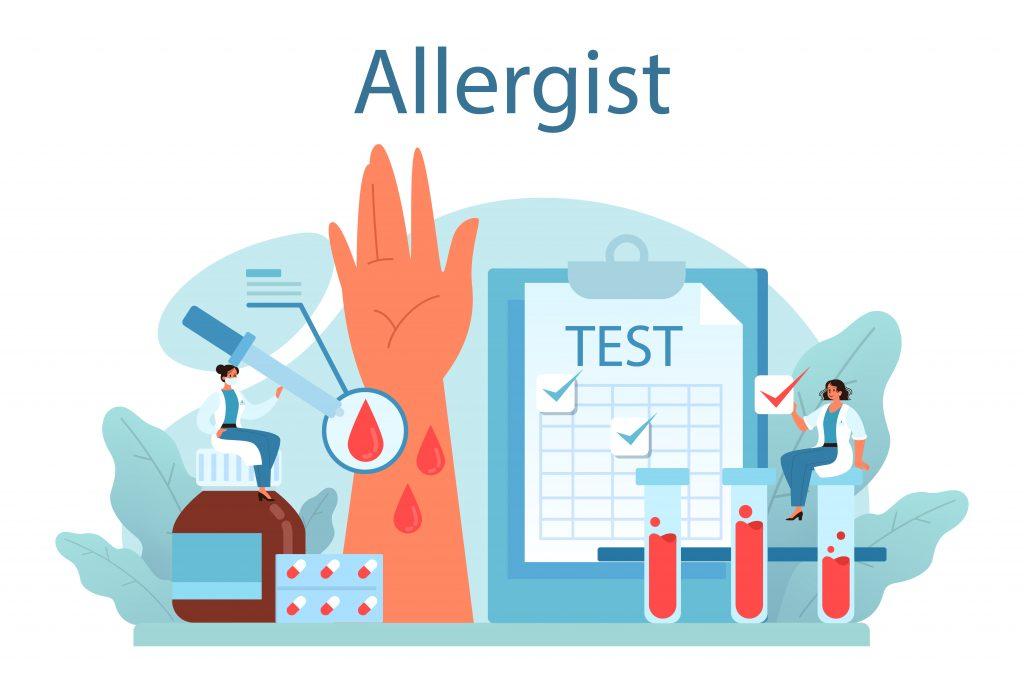
Allergy testing reveals potential allergens, such as mold, pet dander, bee stings, and peanuts. A healthcare professional will prick you with an allergen during a skin prick test to look for a wheal (raised mark), rash, or other symptoms. IgE antibodies can be examined using blood testing. You can control your allergies by using the findings as a guide.

What is the procedure?
Almost everyone develops an allergy to something at some point in their lives. Since no two human bodies are alike, something that can cause an allergic reaction in one person may not do so in another. Knowing your allergic reactions will help you avoid them rather than having to seek treatment after coming into touch with them.
Read MoreAllergy testing reveals potential allergens, such as mold, pet dander, bee stings, and peanuts. A healthcare professional will prick you with an allergen during a skin prick test to look for a wheal (raised mark), rash, or other symptoms. IgE antibodies can be examined using blood testing. You can control your allergies by using the findings as a guide.

What is the procedure?
Almost everyone develops an allergy to something at some point in their lives. Since no two human bodies are alike, something that can cause an allergic reaction in one person may not do so in another. Knowing your allergic reactions will help you avoid them rather than having to seek treatment after coming into touch with them.
Typically, your doctor will test your allergic reactions before prescribing any drugs or treatments. A medicine that doesn’t work for you may occasionally do more harm than benefit. The majority of the time, a situation like this might cause your body to behave unnaturally, and you might notice a rise in your blood pressure, heart rate, weariness, or skin conditions, among other things. In some extremely rare circumstances, an allergic reaction can cause a coma and could be fatal if prompt medical care is not received.
Let’s assume that it is safe to check your allergies using a set of tests and identify what you are allergic to before the procedure. The allergy tests have been created in a way that makes this conclusion clear. Finding what is truly correct for you and the kinds of agents you feel comfortable working with is preferable to taking a chance in these changing times and with new diseases emerging every day.
How can I tell if an allergy test is necessary?
You may get allergic rhinitis if you are allergic to airborne allergens like dust, pollen, or pet dander. Known additionally as hay fever, this allergic reaction results in:
- Headaches
- Wet, itchy eyes
- Sneezing, nasal congestion, or runny nose
- Breathing difficulties, wheezing, or a persistent cough
- Painful throat
Item allergy symptoms normally appear within 30 minutes of eating the food, although they can also appear up to two hours later. Those who have food allergies could go through:
- Hives, facial, lip, or tongue swelling, as well as generalized itching, are examples of skin complaints.
- Respiratory signs like coughing, wheezing, difficulty breathing, and pressure in the chest or throat.
- GI symptoms include nausea and vomiting, cramps and abdominal pain, diarrhea, and vomiting.
- Symptoms of the cardiovascular system include a pale complexion, a weak pulse, and faintness or dizziness.
Contact dermatitis can occur in people who are allergic to latex, perfumes, or metals like nickel. The skin is impacted by an allergic reaction. You might have
- Blisters or a burning feeling on the skin
- Angioedema and swelling
- Itchy skin or a skin rash
A dermatologist will conduct a patch test to identify these kinds of reactions.
What kinds of testing are there for allergies?
There are various methods for determining allergies. Based on your symptoms and the potential allergens, your healthcare practitioner will decide on the best course of action.
These tests consist of:
- Use a tiny needle to prick the skin on your forearm or back with 10 to 50 different probable allergens during a skin prick (scratch) test from your doctor. Alternatively, your healthcare professional might apply tiny droplets of probable allergens to your skin and then use a tool to softly nick and scratch the region, allowing the liquid to seep into your skin. Typical reactions like redness happen 15 minutes after exposure. A rash or wheals—raised, rounded spots—could be your reaction. This test looks for penicillin, food, and airborne allergy symptoms.
- Intradermal skin test: If the findings of your skin prick test are negative or uncertain, you might be given an intradermal skin test. Your doctor injects tiny amounts of the allergen into your skin’s epidermis (epidermis). This test looks for drug, insect sting, and airborne irritant allergies.
- Patch test: With this test, the origin of contact dermatitis can be identified. Your healthcare professional applies a few drops of an allergen to the skin of your arm before bandaging the area. Alternatively, your doctor might apply a patch (bandage) with the allergen on it. Within 48 to 96 hours, you leave the bandage on and visit the doctor’s office again. The bandage is then taken off so your healthcare professional can examine your skin for any reactions or rashes.
- Your healthcare professional sends a sample of your blood to a lab for a blood (IgE) test. The lab increases the blood sample’s allergen content before measuring the amount of IgE antibodies present. A higher percentage of false-positive outcomes can occur with blood tests.
- Tests of challenge: These tests are only conducted under the direct, on-site supervision of a provider. A small amount of an allergen is ingested (swallowed) by people who have suspected food or medication sensitivities. This test is often carried out by an allergist, a physician who focuses on allergies. Medical oversight is essential. Your doctor will administer an epinephrine shot right away if you experience anaphylaxis in order to stop the reaction.
The safety of allergy testing
Skin testing for allergies is quite secure. Although it’s extremely uncommon for allergy skin tests to result in a serious reaction, it’s crucial to have your allergy test done at an allergy clinic or medical facility where, in the event of an emergency, qualified medical staff can treat you.
The most frequent adverse reaction to allergy skin testing is the development of small, itchy, red, or swollen bumps on the skin. Wheals are what they are. Wheals could be more noticeable before the test and disappear after an hour or two. These wheels can occasionally last for a few days.
Since your body has just been exposed to 58 allergens, an additional adverse impact of allergy testing could be an increase in allergy symptoms. But don’t worry!
After we leave, we’ll give you an antihistamine to treat any allergic symptoms that may have resulted from the allergy test.
An allergy test may, in extremely rare circumstances, result in an acute, severe reaction that necessitates medical intervention. Each Aspire Allergy & Sinus clinic has the necessary supplies, including epinephrine, and tools to handle life-threatening allergic reactions.
Who is qualified for the therapy? (When is the procedure completed?)
This test is available to everyone who wishes to examine their allergy pattern. What might cause an allergic reaction in one individual won’t in another. It is always safe to examine your allergy levels in advance so that you can take the necessary precautions or avoid them. When you want to take a new medication or a prescription drug, the allergy test can also be completed.
Results of Allergy Testing
You will receive the results of your allergy testing at Aspire Allergy & Sinus before you leave the office. You are always provided with a number of treatment plan options when the findings of the allergy testing are presented. These options are made to accommodate different demands and lifestyles. The majority of treatment regimens also include advice on how to improve your allergies at the workplace or at home, as well as immunotherapy such as allergy drops, injections, or ExACT Neuroplasty. You will be able to significantly lessen or perhaps completely eliminate your allergies for many years to come with testing results that identify your allergens and a treatment plan.
The best and most reasonably priced and accurate Allergy Tests with the best dermatologists in the business are available at Epicorium!
FAQs
People with extremely high or low blood pressure should not apply since their blood pressure may behave abnormally if they are allergic to particular allergens. Please speak with your physician. Before undergoing such testing, be sure to speak with your doctor. Additionally, pregnant women should abstain from these exams.
No negative effects will result from a blood test. It depends on whether you are allergic to the chemical, though, if you are undergoing a skin prick test. You might experience allergic reactions in those circumstances. The responses, however, are transient and can go away on their own because these are given in controlled doses. It is safe to undergo these exams.
The reliability of over-the-counter allergy test kits that you can buy at your neighbourhood pharmacy or online is questionable. Some of them conduct the incorrect antibody tests. Additionally, you're more likely to have a false-positive result, which can cause you to unnecessarily avoid particular foods or drugs.



